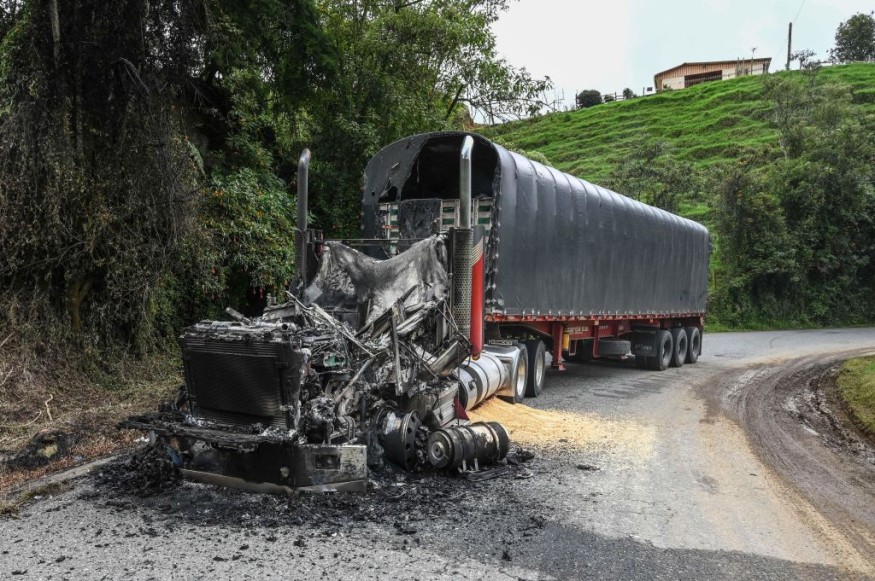Colombia's Gulf Clan Sows Terror Following Otoniel's Extradition in the U.S

Colombia's largest paramilitary group, Gulf Clan, exhibited violence and sowed terror among Colombians after their leader, Otoniel, was extradited into the United States.
According to Al Jazeera, the Gulf Clan enforced a self-declared "armed strike" across Colombia's northwest from the morning of May 5 until midnight on May 9.
The Gulf Clan took control of 11 of Colombia's 32 departments, where it imposed strict lockdowns, shuttered local businesses, closed roads, and disrupted transportation links. The paramilitary group also reportedly warned residents to stay inside their homes or risk being shot or having their vehicles burned.
According to France 24, dozens of roads were blockaded by the Gulf Clan despite the efforts of some 52,000 soldiers and police deployed to restore order.
Although the strike declared by the Gulf Clan is over, residents are still in fear in the aftermath of the incidents.
"You live with the concern that it could happen again tomorrow... Because the Gulf Clan are showing that they have the power to create fear," Raul from Tierralta said.
The Aftermath of Gulf Clan's Wrath in Colombia
According to Colombia's government, the gulf Clan has killed at least eight people, including five security personnel.
However, a spokesperson of Colombia's Special Jurisdiction of Peace (JEP) confirmed that at least 24 civilians were killed during the strike and at least 15 attempted murders were recorded.
JEP was formed in the wake of a 2016 peace deal between the Revolutionary Armed Forces of Colombia (FARC) and the government. The deal aims to investigate, prosecute, and punish those responsible for the most serious human rights violations.
The JEP tribunal also noted that at least 309 acts of violence were committed by the Gulf Clan during their strike. The tribunal added that at least 178 municipalities were under the control of Otoniel's clan, and 22 attacks were reported among uniformed personnel.
Meanwhile, nearly 200 vehicles, including trucks, were burnt by the Gulf Clan.
"They wanted to demonstrate their military strength to show that in many areas of the country they are the de facto authority and not the state," a JEP representative said.
Aside from the killings, several towns affected by the strike announced by the Gulf Clan also reported running out of food and gas supplies. Meanwhile, families were left stranded at transport terminals, unable to get home due to blockaded roads.
Gulf Clan Leader Otoniel Extradited to the U.S.
The Gulf Clan wreaked havoc in Colombia after their leader, Dairo Antonio Usuga, also known as Otoniel, was extradited not the United States, where he and his cartel was accused of tons of cocaine into the U.S. from Colombia.
Otoniel was charged with three count-superseding indictment with leading a continuing Criminal Enterprise from June 2003 through October 2021. He is also charged with participating in an international conspiracy to manufacture and distribute cocaine, knowing and intending that the drugs would be illegally shipped into the U.S.
Otoniel was captured by the authorities from Colombia last October in a rural area in the Uraba region of Antioquia.
This article is owned by Latin Post.
Written By: Joshua Summers
WATCH: Colombia's Most-Wanted Drug Lord Otoniel Captured in Jungle Hideout - From DW News
Subscribe to Latin Post!
Sign up for our free newsletter for the Latest coverage!
















